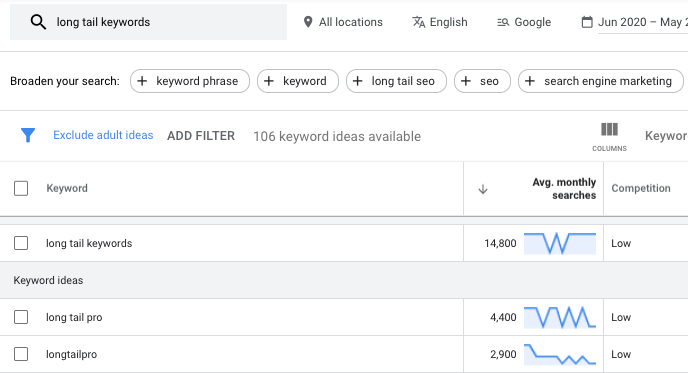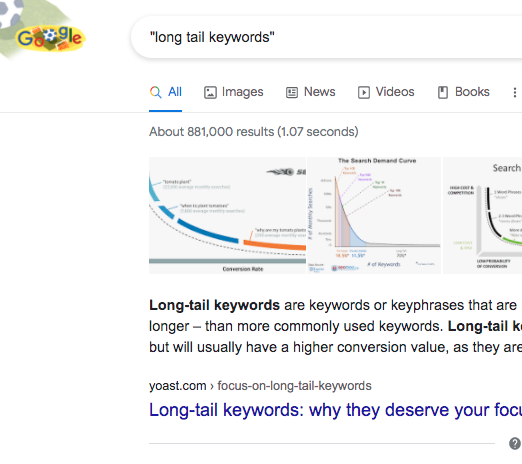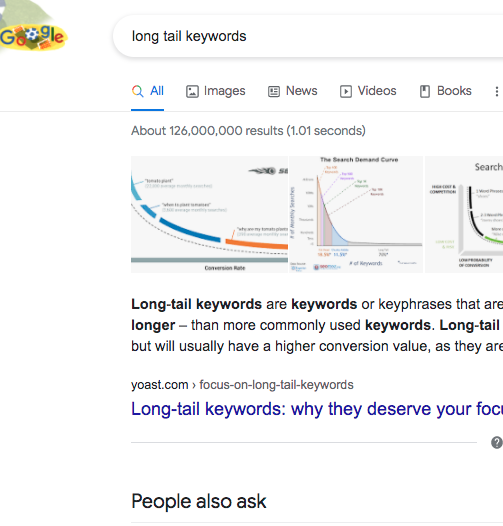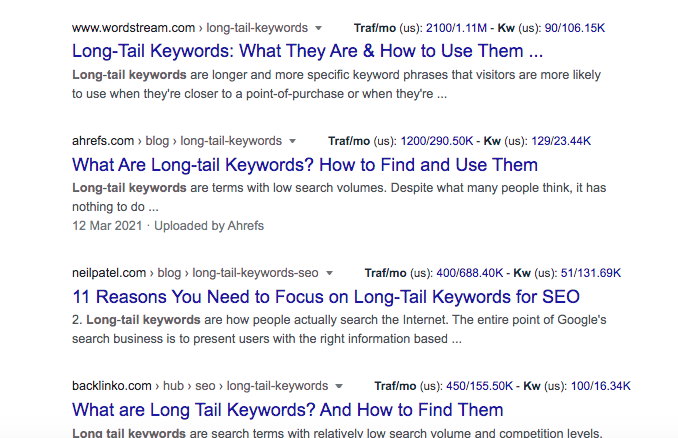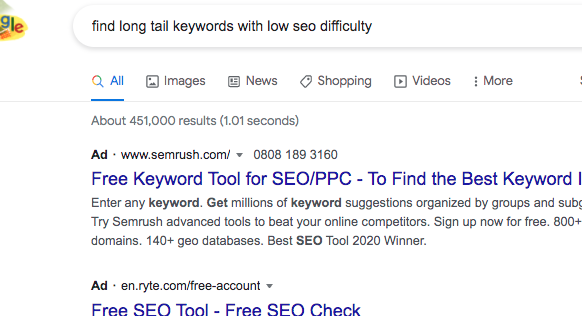There’s a couple of reasons why long tail keywords are important. Despite the fact they get less monthly searches than shorter tail keywords, they also have far less competition on the SERPS (search engine results pages). This means if you use long tail keywords in your content, you have a much better chance of them finding their way to the first page of Google. This means free traffic if you can do it and although there’s considerably less traffic for those key phrases, there’s more chance of a ranking.

A small “cut” of something is worth much more than no share of everything!
If you go after the more competitive keywords, in the hope that all that traffic will be yours, you’ll be disappointed. Your chance of getting ranked for such competitive keywords on the first page of Google is vastly diminished by the huge volume of competing content. Your content may rank on page 10 of Google though, but no-one scrolls through to look at page 10 for their search query.
Why Long Tail Keywords Are Important: Downsides
There’s downsides too of building content using long tail keywords.
Even if your content appears on page one of Google at the very top, you’ll still be sharing the clicks with the adverts and other top few listings. So the main problem with long tail keywords is the lack of traffic. If your long tail keyword gets 30 views a month, for example that’s only one click a day! So even if you get a third of that traffic, it’s only 1 click every 3 days! Since many web based searchers will leave your website after only a few seconds, you can see how this strategy is a very long term one!
Still, if you build enough content, those small numbers add up. Plus, as Google recognises you as an authority on your topic, they are likely to give your SEO (search engine optimisation) a boost too. This all takes time and a lot of work to achieve. More and more people are building content as I write. So there’s a growing amount of competing content.

If you’re aiming for ranking for long tail keywords, it’s well worth writing a good lengthy piece of content which out performs those which rank already. Often Google won’t even rank your content above another, older piece because you haven’t built up the authority to outrank them. Google may not trust you yet, even though your content may be far longer and more superior to the existing one which Google ranks at the top.
A top ranking article might have tens of thousands of back links, which is very difficult to compete with as a newcomer.
Why Long Tail Keywords Are Important: Alternatives
But what’s the alternative? Pay for traffic? Or build content differently? Another way of building content is to write catchy titles and help them go viral. You can look on a site called Buzzsumo.com to find some of the top trending articles. With a good title, more people are more likely to click on the link to read your content. But you first need to get it in front of people in the first place, which means promotion on social media.

Another alternative is to target shorter tail keywords which have more competition. But again you need content promotion to get your articles seen. Even with long tail keyword targeted article, your content might not rank. With a shorter tail keyword, it’s much less likely to rank still.
Short Tail Vs. Long Tail Keywords
Here’s a few examples of short tail and long tail keywords. Let’s start with the title of this article “why long tail keywords are important”. To find long and short tail keywords, type your main “seed” keyword into Google’s keyword planner. I started with “why long tail keywords” as my main keyword in this instance and here’s the results the planner brought up:
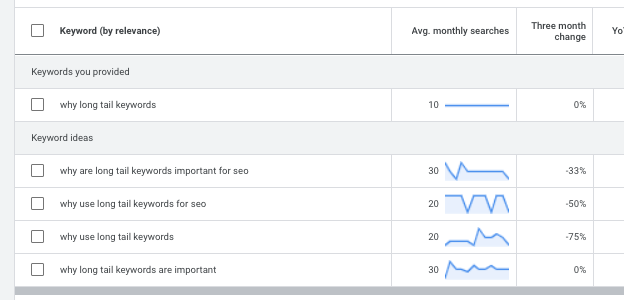
As you can see, the keyword I chose only gets 30 monthly searches. So if I ranked on top of Google for this keyword, I’d still have to share 1 click a day with the other top ranking websites (and of course adverts, if there are any).
However, let’s look at a more competitive keyword for comparison.
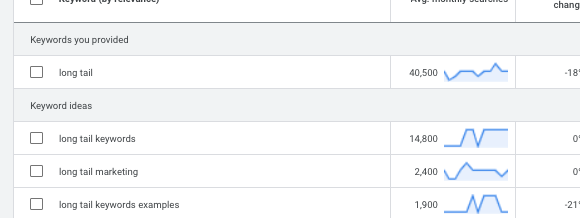
“Long tail” as a keyword search gets 40,500 monthly visits! Surely I’d be better going after a slice of this traffic? To answer this question we can have a look at the Google search results for a simple search of this keyword and a “phrase” match search.
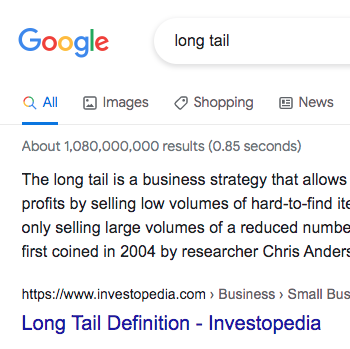
Have a look at the number at the top of the image above. That’s over 1 billion competing search results. Plus, investopedia.com is the top search result, a very well established and high authority site (difficult to outrank). A phrase match search gives us a closer idea to the competing websites which have this phrase targeted specifically with their content:
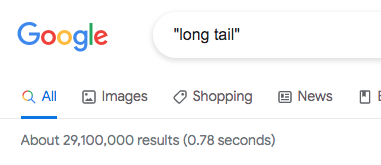
Still the number is pretty high as you’d expect from such a short term phrase as “long tail”. Over 29 million competing search results here.
Comparing Keywords
Now let’s compare these results to my longer tail key phrase I used for this blog title.
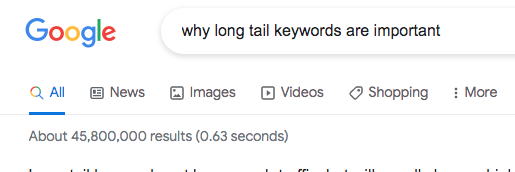
That’s still a pretty high number at over 45 and a half million, but it’s still a lot less competition than “long tail” was. You can see though that the phrase match for this keyword has a much lower number. This might give me a chance to rank this piece of content for that particular keyword.
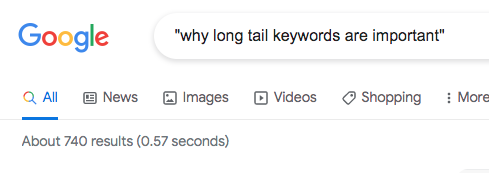
Summary
While I’m not going to get a huge amount of traffic even if this content ranks at the very top of Google, each piece of content you create adds up to domain authority with Google. With thousands of pieces of content on a site, all these articles add up and increase search traffic and domain authority at the same time.
At the beginning of a blogging journey, it can seem daunting to create hundreds of pieces of content only for a small amount of traffic. But over time your efforts compound and eventually you can have a passive income from blogging with this strategy, if you put the work in.
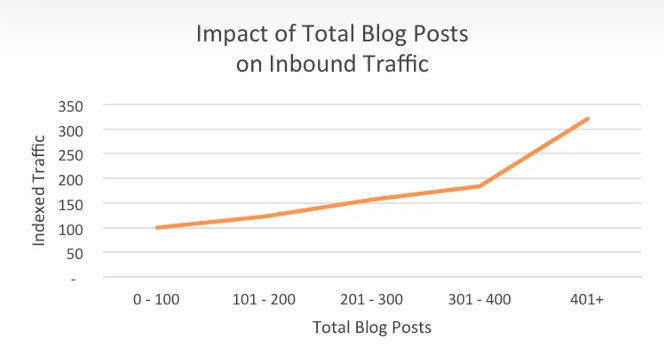
At around 300-400 blog posts you should see an uptick in traffic. As you continue writing more and more content, this compounds to dramatically boost numbers of visitors to your website.
The other important thing about long tail keywords is that they bring in much more targeted traffic than shorter tail keywords do. Take our earlier example of “long tail” versus “why long tail keywords are important”. You can see the second phrase is much more specific. If you’re an affiliate or are promoting something from your website this is pretty important. A shorter phrase is very general while a longer term phrase will bring a different type of visitor to your website. If you can target the long tail phrases which are the most relevant for your business, you can not only bring traffic to your site, but targeted traffic: people who will buy from you!
See also how to find long tail keywords with low SEO difficulty.
